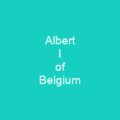Brussels: The Heart of Europe
Imagine a bustling metropolis that’s not just the capital of Belgium but also the de facto capital of the European Union. That’s Brussels, a city where history and modernity intertwine in a unique blend. Nestled within 19 municipalities, including the City of Brussels itself, this vibrant region is home to over 1.2 million people, making it one of Europe’s most dynamic cities. Let’s dive into what makes Brussels so special!
The Capital of Belgium and Beyond
Brussels is officially known as the Brussels-Capital Region, a region comprising 19 municipalities, with the City of Brussels at its heart. This city grew from humble beginnings to become an important hub in Europe, hosting numerous international organizations and institutions. It’s not just the capital of Belgium; it’s also the seat of many European Union bodies, making it a global political powerhouse.
History and Growth
Tracing its roots back to the Stone Age, Brussels has seen centuries of transformation. From Roman occupation to becoming part of the Frankish Empire, the city’s history is rich and varied. The name “Brussels” itself comes from Old Dutch ‘Bruocsella,’ meaning ‘marsh’ and ‘home, settlement.’ Over time, it shifted to French and became officially bilingual, with English also widely spoken.
Modern Brussels
The city’s modernity is evident in its architecture. From Gothic cathedrals like St. Michael and St. Gudula to Art Nouveau masterpieces by Victor Horta, Brussels boasts a diverse range of styles. Its economy is service-oriented, with numerous multinational headquarters, European institutions, and local administrations contributing to its vibrant atmosphere.
Life in Brussels
Living in Brussels means experiencing a melting pot of cultures and languages. While French has become the predominant language, Dutch remains significant. The region is home to a diverse population with over 74% of residents having foreign origins, making it one of Europe’s most cosmopolitan cities. This diversity is reflected in its cuisine, which ranges from traditional Belgian endives to international delicacies.
Culture and Entertainment
Brussels offers a rich cultural scene. From the Royal Theatre of La Monnaie to the vibrant street art, there’s always something exciting happening. The city hosts numerous festivals throughout the year, including the Iris Festival and the Brussels Summer Festival, celebrating everything from music to arts.
Transportation
Navigating through Brussels can be a bit of an adventure due to its extensive public transportation network. With over 40 km of metro lines, 17 tram lines, and numerous bus routes, getting around is relatively easy. The city also boasts two major airports—Brussels Airport and Brussels South Charleroi Airport—and a well-developed port system that connects it to other parts of Belgium and beyond.
Conclusion
In essence, Brussels is more than just a capital; it’s the heart of Europe, pulsating with life, culture, and innovation. From its historical landmarks to its modern institutions, this city continues to captivate visitors and residents alike.

You want to know more about Brussels?
This page is based on the article Brussels published in Wikipedia (retrieved on February 5, 2025) and was automatically summarized using artificial intelligence.






